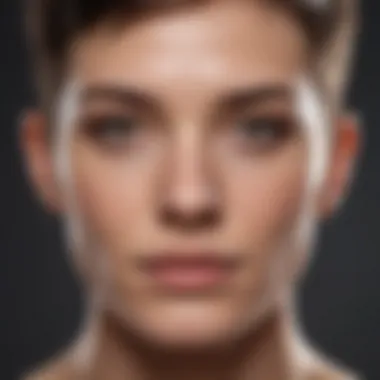Discover the Most Effective Solutions for Body Acne: Expert Insights


Trendy Haircut Trends
In the realm of body acne solutions, it is vital to address not just the surface blemishes but also delve into the root causes that contribute to this common skin condition. Understanding the triggers that lead to body acne can pave the way for effective treatment and preventive strategies. From hormonal fluctuations to diet and lifestyle factors, each aspect plays a crucial role in managing and combating body acne.
Men's Fashion Trends
As we embark on a journey to explore the best solutions for body acne, it is essential to consider how personal grooming habits and clothing choices can impact skin health. The fabric of our clothing, the frequency of washing garments, and even the type of skincare products used can all influence the occurrence of acne on the body. Hence, integrating aspects of men's fashion and style trends becomes not just a matter of aesthetics but also a strategic move towards healthier skin.
Style Tips and Tricks
Delving into the nuances of body acne solutions unveils a world where grooming techniques and style preferences intersect with skincare routines. Elevating one's style game goes hand in hand with implementing effective strategies to address and prevent body acne flare-ups. From selecting breathable fabrics to considering the impact of sweat and friction on acne-prone areas, every sartorial choice can make a difference in promoting clearer and healthier skin.
Trend Alerts
Navigating the landscape of body acne solutions involves staying abreast of the latest trends in men's grooming and fashion. Just as fashion trends evolve, so do skincare innovations that cater to specific concerns like body acne. By aligning one's lifestyle choices with current fashion insights and skincare advancements, individuals can optimize their efforts in combating acne and achieving skin clarity that complements their personal style and fashion sensibilities.
Introduction
Body acne is a prevalent skin condition that can have a significant impact on one's self-esteem and overall skin health. Understanding the factors that contribute to body acne is crucial in developing effective solutions to address and manage this issue. This article aims to delve into comprehensive insights on body acne, from its common causes to the impacts it can have on skin health. By exploring preventive measures, treatment options, natural remedies, and lifestyle changes, individuals struggling with body acne can equip themselves with the knowledge needed to achieve clearer and healthier skin.
Understanding Body Acne
Body acne, also known as bacne, refers to the occurrence of acne breakouts on the back, chest, shoulders, and buttocks. Similar to facial acne, body acne develops when hair follicles become clogged with sebum and dead skin cells, creating an ideal environment for bacteria to thrive. Factors like hormonal fluctuations, genetics, and lifestyle habits can contribute to the development of body acne. Understanding the differences between facial and body acne is essential for implementing targeted treatment and prevention strategies.
Common Causes of Body Acne
Several factors can trigger the development of body acne. Hormonal fluctuations play a significant role, especially during puberty, menstruation, pregnancy, and menopause. Increased sebum production, often influenced by hormones, can lead to clogged pores and acne lesions. Tight clothing that traps sweat and friction against the skin can also exacerbate body acne by creating an environment conducive to bacterial growth. Additionally, certain skincare products, medications, and dietary choices may contribute to acne flare-ups on the body.
Impact of Body Acne on Skin Health
Body acne not only affects one's physical appearance but can also impact skin health in various ways. Acne breakouts can cause inflammation, redness, pain, and in severe cases, scarring. The presence of acne lesions may contribute to feelings of self-consciousness and lowered self-esteem. Moreover, untreated body acne can lead to long-term skin damage and persistent breakouts, requiring more intensive intervention to manage. Understanding the implications of body acne on overall skin health is essential for taking proactive steps towards prevention and treatment.


Preventive Measures
In the realm of skincare, preventive measures play a crucial role in combating body acne effectively. Establishing a robust preventive routine not only helps in addressing existing breakouts but also significantly decreases the likelihood of future flare-ups. By incorporating these essential steps into your daily regimen, you can maintain clear and healthy skin. Effective preventive measures include maintaining good hygiene practices, choosing suitable clothing materials, following a dedicated skincare regimen tailored for acne-prone skin, and considering the impact of diet on skin health.
Maintaining Good Hygiene
Maintaining good hygiene practices is fundamental in averting body acne. Regularly cleansing the skin with a gentle, non-comedogenic cleanser helps remove dirt, excess oil, and impurities that can clog pores and lead to breakouts. Opting for products with salicylic acid or benzoyl peroxide can aid in controlling acne-causing bacteria and reducing inflammation. Additionally, showering after sweating and changing out of sweaty clothing promptly can prevent pore blockages caused by sweat and bacteria buildup.
Choosing the Right Clothing
Selecting the appropriate clothing is pivotal in managing body acne. Opt for loose-fitting garments made from breathable fabrics like cotton to reduce friction and allow better air circulation, preventing skin irritation and breakouts. Avoiding tight clothing, especially in areas prone to acne, can help minimize the risk of exacerbating existing blemishes. Furthermore, regularly washing clothing items, particularly those that come into direct contact with the skin, can prevent the transfer of oils and bacteria.
Skincare Routine for Acne-Prone Skin
Developing a tailored skincare routine specifically designed for acne-prone skin is essential for controlling breakouts and fostering skin health. Incorporate gentle exfoliants to unclog pores, regulate sebum production, and promote cell turnover. Using non-abrasive cleansers and oil-free moisturizers can help maintain skin moisture balance without exacerbating acne. Additionally, applying targeted treatments like serums or spot treatments can address individual breakouts effectively.
Dietary Considerations
When addressing body acne, considering dietary factors is imperative. Research suggests a correlation between high-glycemic diets, dairy consumption, and acne severity. Opting for a diet rich in fruits, vegetables, lean proteins, and whole grains can promote overall skin health. Additionally, staying hydrated and reducing sugar intake may help in managing acne inflammation and reducing breakout frequency.
Treatment Options
In this article, the focus shifts to Treatment Options for body acne, a crucial aspect in addressing this common skin condition. By delving into the various treatment avenues available, individuals can make informed decisions to manage and alleviate their acne effectively. Understanding the significance of treatment options aids in tailoring a suitable regimen that suits individual needs and skin types. Choosing the appropriate treatment can lead to visible improvements in skin health and overall well-being.
Topical Treatments
When it comes to topical treatments for body acne, several key options emerge as prominent choices. Among these options are Benzoyl Peroxide, Salicylic Acid, and Retinoids. Each of these topical treatments plays a unique role in combating acne and promoting healthier skin.
Benzoyl Peroxide
Benzoyl Peroxide is a widely recognized topical treatment for acne, known for its anti-bacterial properties and efficacy in unclogging pores. Its ability to reduce inflammation and kill acne-causing bacteria makes it a popular choice for many individuals dealing with body acne. Despite some drying effects, Benzoyl Peroxide's effectiveness in targeting acne makes it a valuable addition to acne treatment routines.
Salicylic Acid


On the other hand, Salicylic Acid is famed for its exfoliating properties, penetrating deep into the pores to remove excess oil and dead skin cells. This characteristic makes Salicylic Acid a beneficial choice for individuals with acne-prone skin, as it helps prevent clogged pores and breakouts. While mild irritation may occur in some cases, the overall advantages of Salicylic Acid in promoting clear skin outweigh potential drawbacks.
Retinoids
Retinoids offer a comprehensive approach to acne treatment by promoting cell turnover and preventing the formation of new acne lesions. Their ability to unclog pores and reduce inflammation marks them as a valuable asset in combating body acne. Despite some initial dryness and irritation, the long-term benefits of using Retinoids in acne treatment make them a favored choice for individuals seeking clearer, healthier skin.
Oral Medications
In certain cases where topical treatments may not suffice, oral medications like Antibiotics and Hormonal Therapy become viable options for managing severe body acne. These medications work internally to target acne causes and symptoms, offering a systemic approach to treatment.
Antibiotics
Antibiotics play a crucial role in combating acne by reducing inflammation and targeting acne-causing bacteria from within. Their systemic impact on the body's response to acne makes them a beneficial choice for individuals with moderate to severe acne. Despite concerns regarding antibiotic resistance and potential side effects, antibiotics remain a staple in dermatological practices for managing acne effectively.
Hormonal Therapy
Hormonal Therapy addresses acne at its root cause by regulating hormone levels that contribute to acne development. By balancing hormonal fluctuations, this treatment option helps in controlling breakouts and promoting clearer skin. While hormonal therapy may require close monitoring and have specific considerations for each individual, its efficacy in managing hormonal acne makes it a valuable addition to acne treatment regimens.
Professional Procedures
For individuals seeking advanced solutions for stubborn or recurrent body acne, professional procedures like Chemical Peels and Laser Therapy offer intensive interventions to address acne at a deeper level.
Chemical Peels
Chemical Peels provide deep exfoliation to remove dead skin cells and unclog pores, promoting skin renewal and reducing acne formation. Their ability to improve skin texture and tone makes them a popular choice for individuals looking to rejuvenate their skin and reduce acne scarring. Despite potential redness and peeling post-treatment, the long-term benefits of chemical peels in enhancing skin quality make them a sought-after procedure in dermatological practices.
Laser Therapy
Laser Therapy presents a non-invasive approach to acne treatment by targeting acne-causing bacteria and reducing inflammation without harsh side effects. Its precision in treating specific acne lesions and stimulating collagen production makes it a promising solution for individuals with acne-prone skin. Despite potential mild discomfort during the procedure, the overall effectiveness and minimal downtime associated with laser therapy make it an attractive choice for those seeking long-lasting results in acne management.
Natural Remedies


Natural remedies play a crucial role in the realm of skincare, particularly in addressing body acne. In this article, the focus on natural remedies underscores the significance of harnessing botanical and herbal solutions to combat skin issues effectively. Natural remedies offer a gentle yet potent approach to skincare, making them suitable for various skin types, including sensitive skin. These remedies harness the power of nature's ingredients, devoid of harsh chemicals often found in conventional products, aligning with a holistic approach to skin health.
Tea Tree Oil
Tea Tree Oil holds a prominent place in the array of natural remedies for body acne. Renowned for its anti-inflammatory and antimicrobial properties, Tea Tree Oil presents itself as a formidable ally in combating acne-causing bacteria while reducing redness and swelling. When applied topically, Tea Tree Oil can help unclog pores, regulate sebum production, and accelerate the healing process of acne lesions. However, caution must be exercised, as undiluted Tea Tree Oil may cause skin irritation in some individuals, underscoring the importance of patch testing before widespread use.
Aloe Vera
Aloe Vera emerges as a versatile natural remedy with multifaceted benefits for skin health, including its efficacy in managing body acne. Praised for its soothing and anti-inflammatory properties, Aloe Vera gel can help alleviate acne-related inflammation, redness, and discomfort. Moreover, the hydrating characteristics of Aloe Vera promote skin healing and regeneration, fostering a smoother complexion. When applied consistently, Aloe Vera aids in reducing acne scarring and blemishes, imparting a rejuvenated appearance to the skin.
Apple Cider Vinegar
Apple Cider Vinegar's inclusion in natural remedies for body acne stems from its astringent and exfoliating properties, making it a valuable asset in the pursuit of clearer skin. The acidic nature of Apple Cider Vinegar helps balance the skin's pH levels, thereby reducing excess oil production and preventing bacterial growth. Additionally, its exfoliating action aids in removing dead skin cells, unclogging pores, and promoting skin renewal. Diluted Apple Cider Vinegar can be used as a toner or spot treatment, but it is essential to monitor skin tolerance to avoid adverse reactions.
Lifestyle Changes
Lifestyle changes play a pivotal role in managing body acne effectively. By incorporating specific modifications into your daily routine, you can significantly improve your skin's health and reduce breakouts. Emphasizing the importance of a holistic approach, lifestyle changes encompass various elements like stress management, regular exercise, and adequate sleep. These factors are not only beneficial for your skin but also for your overall well-being. When considering lifestyle changes, it is essential to focus on sustainable practices that align with your preferences and schedule.
Stress Management
Stress management is a crucial component of maintaining clear skin. High stress levels can trigger hormonal imbalances that contribute to acne flare-ups. Engaging in stress-relieving activities such as meditation, deep breathing exercises, or yoga can help regulate cortisol levels and alleviate skin issues. Additionally, developing healthy coping mechanisms and time-management strategies can reduce the impact of stress on your skin. Prioritizing self-care and mental well-being is integral to achieving lasting improvements in your skin's condition.
Regular Exercise
Incorporating regular exercise into your routine can benefit your skin by promoting circulation and reducing inflammation. Physical activity helps flush out toxins through sweat, which can aid in preventing clogged pores and breakouts. Whether you prefer cardio workouts, strength training, or yoga, staying active can boost your skin's clarity and overall health. It is important to choose exercises that you enjoy and can commit to regularly to maximize the skin-enhancing effects of physical activity.
Adequate Sleep
Quality sleep is essential for skin renewal and repair. During deep sleep stages, the body undergoes cellular regeneration, including skin cells. Inadequate sleep can lead to increased stress levels and imbalances in hormones, potentially aggravating acne symptoms. Prioritizing a consistent sleep schedule and creating a conducive sleep environment are key to promoting healthy skin. Improving sleep hygiene practices and ensuring sufficient rest can have a profound impact on your skin's resilience and appearance.
Conclusion
Steering through the intricacies of body acne solutions brings us to a crucial juncture - the conclusion. This segment serves as the epitome of our discourse, consolidating key insights and implications delineated earlier. Delving deep into the intricacies of skincare, we unearth the significance of proactive measures and the selection of appropriate remedies in combating this dermatological concern.
What sets this conclusion apart is its practical application. By distilling a myriad of informational nuggets, we provide a roadmap for both tackling existing eruptions and precluding future outbreaks. The amalgamation of preventative techniques, treatment modalities, and lifestyle adjustments coalesces into a holistic approach towards sculpting clearer and healthier skin.
At the core of this culmination lies the empowerment of individuals grappling with this condition. Harnessing a multitude of strategies equips readers with the arsenal needed to navigate the labyrinth of body acne with acumen and efficacy. Whether one opts for mainstream treatments or veers towards natural remedies, the overarching goal remains fixed - to emancipate individuals from the clutches of body acne.
By culminating our exploration with this comprehensive elucidation, we foster an environment where informed decisions pave the way for improved skin health. The nuanced understanding garnered throughout this guide transcends mere skincare; it fosters a mindset of self-care and empowerment, encapsulating the ethos of resilience against a common, albeit formidable, skin affliction.















